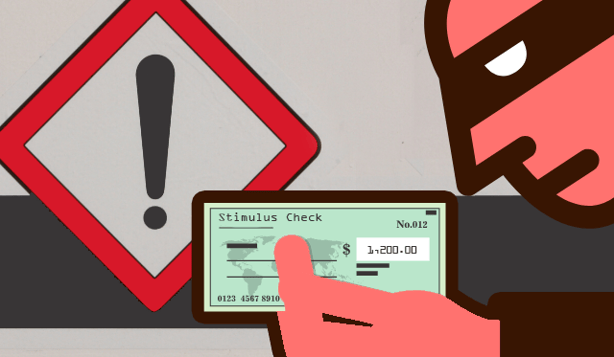
Since the government announced it would be sending $1,200 to qualifying Americans, fraudulent activity has skyrocketed. The Louisiana Department of Revenue has warned taxpayers to protect themselves against thieves phishing for stimulus money and financial information.
According to a statement on the U.S. Treasury Department's website, Louisiana residents should be on the lookout for calls, emails, and other communications claiming to be from the Treasury Department. These fraudulent messages contain COVID-19 related offers and requests in exchange for personal financial information, such as:
- Grants
- Stimulus payments
- Fees and penalties
- Purchase of gift cards
Here are some recent examples of tax-related social engineering scams.
Scam 1: Pay the penalty
Scam artists have been targeting unsuspecting tax payers and threatening to withhold their stimulus check until they pay a fee.
Scam 2: Tax lien scam
Tax payers have been receiving bills from the “Bureau of Tax Enforcement,” and other fake government agencies, claiming they have overdue taxes. This scam may also reference the IRS to confuse potential victims into thinking the letter is from a real agency.
Similarly, victims may receive information about a special program that resolves tax liens for a small fee. As it turns about, this program is “special” because it’s a scheme. This recently happened to an East Baton Rouge Parish resident, who thankfully learned of its malicious intent before sending any personal information over.
Scam 3: Unbelievable rates
Scammers are trying to exploit the established trust between financial institution and its members. Fraudsters have been going online disguised as affiliates of banks and credit unions, offering amazing rates. Unfortunately, the deal is too good to be true. The scammer is actually phishing for your personal information.
If you’re worried about falling victim to a scam, just remember:
- Your bank or credit union will never call, email, or text you asking for account details, Social Security numbers, or other personal information. They already have it.
- Neither the Louisiana Department of Revenue nor the IRS will contact any taxpayer to ask for personal information.
- There are no fees associated with the delivery of stimulus funds.
- Anyone with overdue state taxes will first hear from the state by mail — never by phone —with details regarding how much is owed, according to the revenue department.
- The IRS most often gets in touch with taxpayers via mail.
How to spot a scam.
Scammers give themselves away when they ask for payment via specific means, including a wire transfer or prepaid gift card. Scams are also easily spotted by claims of urgency or threatening language. Another red flag is poor writing skills, including grammatical errors, awkward syntax and misspelled words.
What to do if you're targeted by scammers.
Louisiana residents who suspect they are victims of identity theft can report the crime to the police, report suspected fraud to the three major credit-reporting bureaus and submit a Louisiana Identity Theft Affidavit to the LDR Criminal Investigations Division.
If you received a suspicious email, send it directly to your local and federal government, at usa.gov/stop-scams-frauds.
Fraud attempts start to spike around tax season, so we recommend that all of our members download the MyCardRules app. It's 100% free and gives you the power to shut off your Louisiana FCU card at any time.
Sources:
New Orleans CityBusiness | Nola.com | Internal Revenue Service
Like this article? Subscribe to our blog and have great financial insights delivered to your inbox weekly.




